At Home in the Dark Read online
Page 29
Fallows had met Stockton and the boys only a week ago, on the night he arrived at Hosea Kutako International. The Stockton gang were fresh off a BA flight from Toronto. Fallows had flown private from Long Island in the Gulfstream. Fallows never bothered with public aircraft. He had an allergy to standing in line to take off his shoes, and he treated it with liberal applications of money. As they were all arriving in Windhoek at roughly the same time, the resort had sent a G-Class Mercedes to gather them up and bring them west across Namibia.
They had only been in the car for a few moments before Immanuel Stockton realized he was the very same Tip Fallows who operated the Fallows Fund, which held a heavy position in Stockton’s own pharmaceutical firm.
“Before I was a shareholder, I was a client,” Fallows explained. “I proudly served my nation by feeding myself into the woodchipper of a war I still don’t understand. I crawled away in shreds and stayed high on your narcotic wonders for close to five years. Personal experience suggested it would be a good investment. No one knows better than me how much a person will pay to escape this shitty world for a while.”
He was trying to sound wise, but Stockton gave him an odd, bright, fascinated look, and clapped him on the shoulder, and said, “I understand more than you might think. When it comes to the luxury goods—cigars, furs, whatever—nothing is worth more than an escape hatch.”
By the time they spilled out of the big Mercedes, four hours later, they were all in a jolly mood, and after check-in, they took the conversation to the bar. After that, Stockton and Fallows drank together almost every single night, while Peter and Christian horsed around in the pool. When the boy, Christian—he was eighteen, but still a boy to Fallows—asked if they could come with him to see him bag his cat, it never even crossed his mind to say no.
“The little door?” Fallows asked now. “The hell’s that? Private game reserve?”
“Yes,” Stockton nodded sleepily. The smell of Laphroaig exuded from his pores and his eyes were bloodshot. He had had a lot to drink. “It’s Mr. Charn’s private game reserve. Invitation only. But also, the little door is . . . a little door.” And he laughed again—almost giggled—very softly.
“Peter says its expensive,” said Christian Swift.
“Ten thousand dollars to look through the door. Ten thousand more to walk on the other side. Two hundred and thirty to hunt there, and you only get the one day. You can bring a trophy back, but it stays with Mr. Charn, at the farmhouse. Those are the rules. And if you don’t have your big five, don’t even bother sending him an email. Charn doesn’t have any patience for amateurs.”
“For a quarter a million dollars, you better be hunting unicorn,” Fallows said.
Stockton raised his eyebrows. “Close.”
Fallows was still staring at him when Christian touched his knee with the knuckles of one hand. “Mr. Fallows. Your cat is here.”
Christian was all alertness, down on one knee, close by the open flap, gently offering Fallows his big CZ 550. For a moment, Fallows had half-forgotten what he was doing there. The boy nodded at one of the night-vision monitors. The lion stared into the camera with radioactive green eyes as bright as new minted coins.
Fallows sank to one knee. The boy crouched beside him, their shoulders touching. They peered through the open flap. In the dark, the lion stood beneath the camel thorn. He had turned his great, magnificent head to look at the blind, with eyes that were intelligent and aloof and calmly forgiving. It was the gaze of a king bearing witness to an execution. His own, as the case happened to be.
Fallows had been closer to the old cat, just once, and at the time there had been a fence between the lion and him. He had studied the grandfather through the chicken wire, staring into those serene, golden eyes, and then told the game master he had chosen. Before he walked away, he made the lion a promise, which he now meant to keep.
Christian’s breath was shallow and excited, close to Fallows’ ear. “It’s like he knows. It’s like he’s ready.”
Fallows nodded, as if the boy had spoken some sacred truth, and gently squeezed the trigger.
At the rolling boom of the shot, Peter Stockton woke with a little scream, twisted in his tangle of sheets, and fell out of the cot.
Christian Tears His Shirt
Christian followed the man Fallows out of the tent. The killer crossed the ground in slow, careful steps, always planting his feet just so, like a pallbearer lugging one corner of an invisible coffin. He laughed and smiled easily, but he had attentive, chilly eyes, the color of lead. Those eyes made Christian think, randomly, of the moons around Saturn, airless places where the seas were acid. Peter and his father enjoyed a good shoot, would yell with pleasure when a bullet thwacked into the hide of a crocodile, or raised a puff of dust off a buffalo’s flank. The way Fallows killed, it was as if he himself was the weapon, and the gun was only incidental. Pleasure didn’t come into it.
The lion’s tail lifted slowly and slapped the dust. Lifted—held in place—and thumped the dust again. The big cat lay toppled on its side.
For a time, Fallows sat alone with his lion and the others hung respectfully back. Fallows stroked its wet muzzle and stared into its patient, still face. Perhaps he spoke to it. Christian had overheard Fallows saying to Mr. Stockton that after he got his lion he might give up hunting, that there was nothing left to go after. Stockton had laughed and said, what about hunting a man? Fallows had looked at him with those chilly, distant eyes, and said, “Hunted them and been hunted by them and have the wounds to prove it.” Peter and Christian had debated, ever since, how many men he had killed. It delighted Christian, to know a no-kidding agent of death.
Some San ranch hands materialized out of the night from their own hideaway and a cheer went up at the sight of the dead lion. One unzipped a canvas cooling bag and dug in the ice for beers. The tail struck the ground again, and Christian imagined he could feel the earth vibrating from the blow. But then Christian had a colorful imagination. Stockton helped Fallows to his feet and handed him an icy Urbock.
Peter pinched his nose. “God. Smells like shit. They ought to groom them before a hunt.”
“That’s the chickens, dumbass,” Peter’s father said.
The tail rose and fell with a whap.
“Should he shoot it again?” Christian asked. “Is it suffering?”
“No. That’s one dead cat,” Stockton said. “Nevermind the tail. They do that. It’s a mindless post-mortem spasm.”
Christian sank down by the lion’s head, sketchpad in hand. He stroked the lion’s vast, trembling mane, tentatively at first, then more firmly. He leaned close to one velvety ear, to whisper to it, before it was gone, all the way gone: to say fare-thee-well. He was only barely sensible of Peter hunkering down beside him, and the two older men talking behind them. For the moment he was alone with the lion in the profound stillness between life and death, a separate and solemn kingdom.
“Will you look at this paw?” Peter asked, drawing him back to the now. Peter lifted the lion’s great limp foreleg, spreading the leathery pads with his thumb.
“Hey there,” Fallows said, but Christian wasn’t sure who he was talking to.
“Make a hell of a paperweight, wouldn’t it?” Peter asked, and growled, and waved the paw at Christian in a lazy swipe.
The paw extruded smooth, sharp hooks of yellowing keratin. A tendon in the foreleg went taut. Christian sprang, throwing his shoulder into Peter’s chest. He was fast. The lion was faster. Fallows was faster still. Old, and broken more than once, but fastest of them all.
Fallows hit Peter, who jolted into Christian, and all three of them slammed into the hardpan. Christian felt something snag his shirt, as if the fabric caught on a branch for a moment. Then he was flattened under the other two and all the breath smashed out of him. Fallows kicked, turning onto his side, and rolling the rifle down off his shoulder and into his hands in one fluid motion. The barrel settled into the soft underside of the lion’s jaw. The gun w
ent off with a shattering crack that made Christian’s ears ring.
Stockton’s beer slipped out of his hand and hit the dirt where it spouted foam. “Peter? Peter! The fuck is wrong with you?”
Peter was the first to struggle out from the pig pile. He left Christian and Fallows sprawled in the dirt, both of them panting for breath, as if they had collapsed together after a hard sprint. The old soldier groaned exquisitely. Peter stood over them, staring down at the lion in a dazed sort of way, and slapping his own bottom to get the dust off his shorts. He remained in a foggy-eyed trance until his father grabbed him by the shoulder and wrenched him around. Mr. Stockton’s face was an alarming shade of red, except for a branch of arteries in his brow, which bulged, pale and shiny, in high relief.
“You fuckin’ asshole,” Peter’s father said. “You know what you just did? You just wrecked his fucking trophy. Mr. Fallows paid thirty thousand for that cat, and now there’s a hole the size of a golf ball in its face.”
“Dad,” Peter gasped. His eyes were shiny with shock and grief. “Dad.”
“It’s not ruined,” Fallows said. “Easily fixed by the taxidermist.” He stared up into the darkness. “I might be ready for the taxidermist myself.”
Peter Stockton looked from Fallows to his father and back again with brimming eyes.
“How you like that, Pete?” Christian said. His own giddy voice was muffled and distant, as if he had cotton wadding stuffed in his ears. “Mr. Fallows just saved your ass. Lucky for you! That’s your best feature.”
The San ranch hands had gone still in the tense aftermath of the gunshot. Now, though, they roared with laughter, and erupted into cheers. One of them grabbed Peter by the hands and another shook a beer and let it foam over the teenager’s head. In a moment, Peter went from close to tears to crying out in laughter. Stockton gave his son a resentful, furious look . . . and then his shoulders dropped and he laughed too.
Christian felt a cool trickle of air on bare skin, and peered down, and fingered two long slashes in his shirt. The very white chest beneath was unmarked. He laughed and looked at Fallows.
“I’m going to keep this shirt the rest of my life. That’s all the trophy I need.” He considered for a moment, then said, “Thanks for not letting me get clawed to bits.”
“I didn’t save anyone. You moved first. You jumped like a deer.” Fallows was smiling . . . but his eyes were thoughtful.
“I don’t think so, Mr. Fallows,” Christian told him, modestly.
“We know what’s what around here, Fallows,” Stockton said, reaching down with his big hands to squeeze the little man’s shoulder. “We know a man when we see one.” And he turned his beer over and poured it on Fallows head, while the San whooped it up.
Christian gently collected up his drawing pad from the dust so no one could see what he had been drawing.
Stockton Repays a Debt
When the bell chimed, Stockton went to the door of the suite and opened it on a crack. Fallows was in the hall.
“Come in. Be careful, though. It’s dark in here,” Stockton warned him.
“What’s with the lights?” Fallows asked, as he slipped into the room. “Are we attending a presentation or a séance?”
The lights were off and the curtains drawn in Mr. Charn’s corner suite on the fourth floor of the Four Seasons, across from the Boston Common. A single lamp shone, on an end table, but the usual light bulb had been swapped out for one that was tinted red. Stockton had expected the red light. Stockton had seen the Edwin Charn show before.
He opened his mouth to explain—or try to explain—or at least press Fallows to be patient—but Charn spoke first.
“Get used to it, Tip Fallows,” came the reedy voice, wavering with age. “If I offer you a spot on my next huntin’ party, you’ll need to get used to the half light. What’s to be shot on the other side of the little door will be shot at dusk, or not a-t’all.”
Charn sat in a striped easy chair, to the left of the loveseat. He wore a spritely yellow bow tie and suspenders that pulled his pants too high. Stockton thought he dressed like the benevolent host of a television program for small children, one where they practiced naming the colors and counting to five.
The boys sat together on the loveseat, Peter in a tailored Armani suit, Christian in a blue blazer. Christian didn’t come from money, had made it to private school on his wits. Stockton was proud of his son for looking past the other boy’s second-hand wardrobe, and for quietly accepting Christian’s broke, shy, strictly religious foster parents. Of course, Christian was probably the only reason Peter had himself graduated from private school—Stockton was sure Christian let him copy on exams, and he had probably written more than a few of Peter’s papers. That pleased Stockton as well. You looked out for your friends and they looked out for you. That was the very reason why Stockton had insisted on introducing Fallows to Mr. Charn. Fallows had been looking out for Stockton’s boy in Africa, three months ago; Stockton took a certain mellow satisfaction in knowing he could pay the man back with interest. To be honest, a trip through the little door was probably worth any number of overweight, intellectually lazy sons.
A birdcage sat on the coffee table, covered with a sheet of red linen. Or maybe it was white linen and only looked red in the horror-house light, Stockton wasn’t sure. If Stockton was running the presentation, he would’ve started with the birdcage, but he wasn’t, and Charn wouldn’t.
“Thanks for agreeing to meet me, Mr. Charn,” Fallows said. “I’m very interested to hear about the little door. Stockton tells me there’s nothing like it anywhere in the world.”
Charn said, “A-yuh. He’s right enough. Thank you for comin’ all t’way to Boston. I don’t much care to leave Maine. I don’t like to leave the door for long, and t’isn’t necessary for me to travel widely to drum up business. Word passes around. The truly curious come to me. I only offer the two hunts a year, and next is on the twentieth of March. Small groups only. Price non-negotiable.”
“I heard about the price. That’s most of the reason I came . . . the sheer entertainment value of hearing what kind of hunt a person could get for quarter of a million dollars. I can’t imagine. I spent forty thousand to kill an elephant and felt I overpaid.”
Mr. Charn raised an eyebrow and cast a questioning look at Stockton. “If it’s beyond your means, sir, then—”
“He’s got the money,” Stockton said. “He just needs to see what he’d get for it.” He spoke with a certain smooth, confident humor. He had not forgotten how he himself felt when he was in Fallows’s boots, recalled his own disgust at the price tag, and his icy unwillingness to be conned. The pitch had turned him around and it would turn Fallows around too.
“I’m just wondering what I could possibly shoot that would be worth that kind of bread. I hope it’s a dinosaur. I read a Ray Bradbury story about that, when I was a kid. If that’s what you’re offering, I promise not to step on any butterflies.” Fallows laughed.
Charn didn’t. His calm was almost uncanny.
“And if I do shoot something—I understand I can’t even keep the trophy? All that money and I bring home squat?”
“Your kill will be preserved, mounted and kept at my farmhouse. It may be viewed by appointment.”
“For no additional fee? That’s decent of you.”
Stockton heard the edge in the old soldier’s voice and fought down an urge to put a restraining, comforting hand on Fallows’ arm. Charn wouldn’t be offended by a brittle tone or a sarcastic implication. Charn had heard it all before. He had heard it from Stockton himself only three years before.
“Of course viewing is free, although should you like to take tea while you’re visiting, there is a modest service charge,” Charn said, in a blasé tone. “Now I should like to share a short video. It is not professionally produced. I made it myself, and some years ago. Still, I feel it is more than adequate to my needs. The video you are about to see has not been altered in any way. I don’t expect
you to believe that. In fact, I am sure you will not. That is no matter to me. I will establish its veracity beyond any doubt before you leave this room.”
Charn pressed a button on the remote.
The video opened with a view of a white farmhouse against a blue sky on the edge of a field of straw. Titles whisked onto the screen, sliding from left to right.
Charn Estate, Rumford, Maine.
They were the sort of titles a person could create in-camera, if they didn’t care that it made their video look like childish junk.
There was a cut to a second-floor bedroom, with homey New England touches. An urn, patterned with blue flowers, stood on the bedside table. A brass bed dressed with a handmade quilt took up most of the space. Stockton had slept in that very bed on his last trip to Rumford—well, not slept. He had lain awake the whole restless night, springs digging into his back through the thin mattress, field mice scuttling frantically in the ceiling. The thought of the day to come had put sleep well out of reach.
New titles swept in, chasing off the previous titles.
4 rustic bedrooms, shared bathroom facilities.
“Pretty sure ‘rustic’ means cold and uncomfortable,” Stockton heard his son murmur to Christian. Good Christ, the kid was loud, even when he whispered.
Peter had been too young to go the last time. He wasn’t much more mature now, but maybe Christian would keep him in line. Stockton had arranged this meeting to thank Fallows, for saving his son. Not for the first time, it crossed his mind he would be even more grateful to Fallows if he hadn’t saved the fat little nose-picker.
The video jumped to a shot of a small, green door—a grown man would have to crawl through it—set at one end of a room on the third floor of the farmhouse. The door! Stockton thought, with the passion of a convert thoughtlessly crying out hallelujah at the sight of a holy relic. The sight of it inspired and delighted him in a way his son never had, not even on the day of his birth.
The ceiling was low on the top floor and at the far side of the room, opposite the camera, it banked steeply downward, so the far wall was only about three feet high. The room contained a single dusty window with a view of the field outside. A new title swept onto the screen:

 The Fireman
The Fireman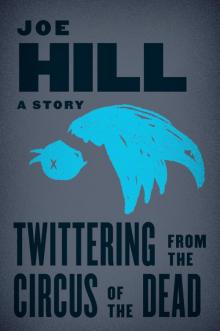 Twittering From the Circus of the Dead
Twittering From the Circus of the Dead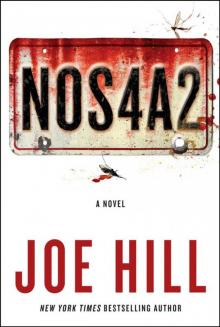 Nos4a2
Nos4a2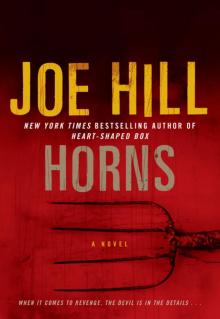 Horns
Horns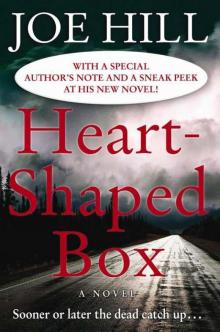 Heart-Shaped Box
Heart-Shaped Box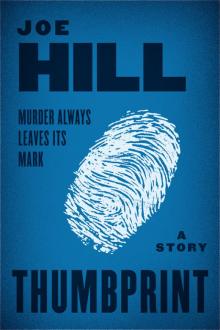 Thumbprint: A Story
Thumbprint: A Story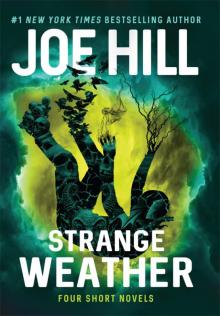 Strange Weather
Strange Weather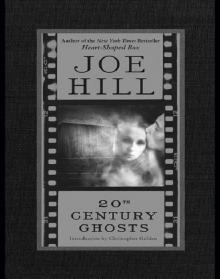 20th Century Ghosts
20th Century Ghosts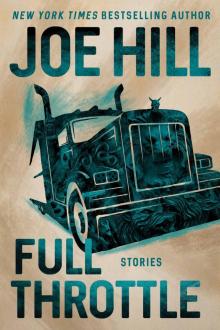 Full Throttle
Full Throttle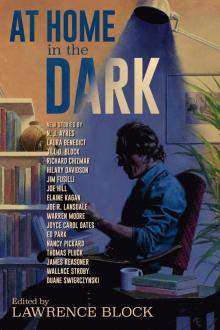 At Home in the Dark
At Home in the Dark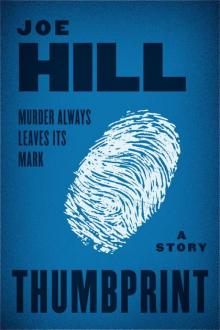 Thumbprint
Thumbprint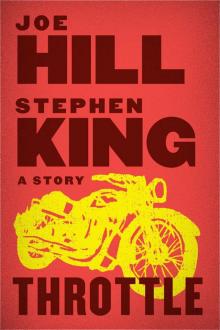 Throttle
Throttle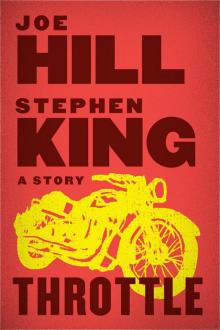 Throttle (Kindle Single)
Throttle (Kindle Single)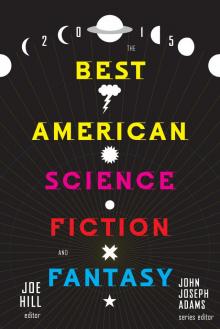 The Best American Science Fiction and Fantasy 2015
The Best American Science Fiction and Fantasy 2015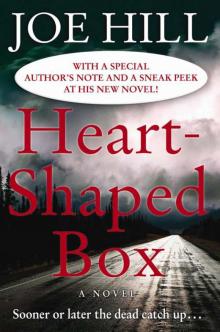 Heart-Shaped Box with Bonus Material
Heart-Shaped Box with Bonus Material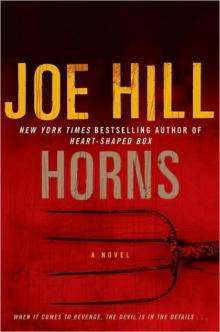 Horns: A Novel
Horns: A Novel